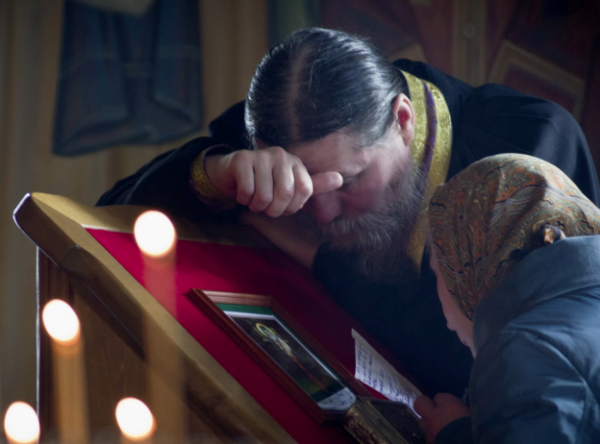Confession is a divine commandment which is necessary for the healing of our souls. Confession has its roots in the Old Testament. Moses commanded that the people confess their sins, so that men and women might be trained in truth and uprightness, and also to avoid lawless acts (Numbers 5:6-7). Furthermore, Moses said “If a person sins he shall confess that he has sinned in that thing; and he shall bring his trespass offering to the Lord for his sin which he has committed” (Leviticus 5:1,5-6). In other words, before an Israelite could make his offering at the altar, he was required to first confess his sins. This is no different than the contemporary Christian practice to first go to confession before partaking of the Eucharistic sacrifice which is offered on the Christian altar.
Concerning confession in the New Testament, we read in Matthew 3:5-6: “Then Jerusalem, all Judea, and all the region around the Jordan went out to him and were baptized by him in the Jordan, confessing their sins.” The Apostle James, the brother of the Lord, enjoins us, saying, “Confess your trespasses to one another, and pray for one another, that you may be healed” (James 5:16). Confession is also mentioned in the Acts of the Apostles as the gate that leads to Christianity: “And many who had believed came confessing and telling their deeds” (Acts 19:18). The Evangelist John says, “If we confess our sins, He is faithful and just to forgive us our sins and to cleanse us from all unrighteousness” (1 John 1:9).
Many of the Holy Fathers, such as Irenaeus, Clement of Alexandria and Cyprian of Carthage speak about confession as well. The above sampling of evidence that St. Nektarios cites should make it abundantly clear to all that confession is a divine commandment.
Every sin is a disturbance of righteousness. Sin, meaning evil, is non-being, as it was not created by God, and it happened to take the place of good, which it expelled. And so, the birth of sin, that is, evil, brought about a disturbance to the harmony of creation, threatening its very existence. Therefore, the unrighteousness which came from it, being opposed to the will of God itself, is against the Creator of the world Himself. Both Jews and Gentiles advocated the principle that every sin is against God Himself. David, in confession before God, said that he sinned before Him and against God only did he sin. “Against you only have I sinned and done that which is evil in Thy sight” (Psalm 50:6).
In as much as God has redeemed us and saved us through His Son, our Lord Jesus Christ, who will continue to reconcile us with God for the sins that we commit everyday? It is for this reason that our Savior appointed mediators between ourselves and Him. He ordained His apostles, vesting them with His authority to bind and to loose: “If you forgive the sins of any, they are forgiven them; if you retain the sins of any, they are retained” (John 20:23). So then, confession is necessary because it reconciles us with God, Who is spirit and reconciles us spiritually. Thus, it is necessary for us to confess so that we may become friends with God.
To recap, just like a person who has swallowed poison, in order to be delivered from the poison, it must be expectorated, it must literally be vomited up. Sin is also a poison, and it dwells within us. It must also be expectorated and vomited up. This can only be done if we verbalize our sins, if we say them out loud before our spiritual father, who bears witness to our confession before God. There is no other way. And as I have already stated, we must confess our sins before we offer our gift at the altar, before we dare to approach and receive the Holy Eucharist, which is the practice of true believers even from Old Testament times.
Having established the necessity for confession, St. Nektarios goes on to explain its moral and spiritual benefits. For one thing, our moral delusions become fewer and fewer. Left to our own devices, without discussing our spiritual state with our spiritual father on a regular basis, it is impossible for us to curb our delusions about ourselves and to keep our thoughts and mind on a sober and straight path to God. Also, without the necessity to go to confession, there is no accountability. We may shamefully sin before the watchful eyes of God, but somehow it becomes more difficult to confess our shameful deeds in front of our spiritual father.
When we go to confession on a regular basis, we become motivated not to disappoint our spiritual father before whom we have promised God to avoid and to not repeat the sins which we have confessed. Regular confession gradually makes the Christian moral and perfects him, because the knowledge and experience of the spiritual father, from whom the confessing Christian receives edification, on the one hand teaches him what he must embrace and carry out, and on the other hand what he must spurn and flee; for through his knowledge the spiritual father edifies him in virtue, and through his experience he guards him from errors. He comforts him, teaches him, helps him to understand the deceptive machinations of the Evil One, and how to wage successful warfare against them.
The spiritual father encourages his spiritual child, and raises him up when he feels cast down. It is impossible to reap these benefits of confession if we only go to confession once a year. The devil wages warfare against us on a daily basis, and not only once a year. Does it make sense, then, that going to confession only once a year is sufficient? How is going to confession only once a year really going to help us with a spiritual battle in which we are engaged on a daily basis? How is it possible that going to confession once a year can possibly cleanse us of our sins and heal us of our spiritual infirmities?
Perhaps you might say that you receive Holy Communion on a regular basis and that is sufficient to help you and cleanse you from your sins. Absolutely yes, frequent Holy Communion helps us and cleanses us from our sins, but only if we first go to confession and confess our sins. It is not my purpose to discourage anyone from receiving Holy Communion on a regular basis. I remember the days when people would receive Holy Communion only once or twice a year, and it was a long and difficult battle to encourage people to receive Holy Communion more frequently. My purpose, however, is to encourage everyone to make confession a regular part of their lives as well.
St. Nektarios, as I have quoted him, has already established that God has ordained that Holy Confession and Holy Communion should go hand in hand. We have already gone to great lengths to prove and to explain this. This is the Christian practice and this is the way established by God to conquer sin, to grow spiritually, to be healed of our infirmities and to stay on the narrow road of salvation. This is the way to eternal life. Amen.
_________________________________________________________
*”Homilies During Great Lent Volume 1” by St. Nektarios Kefalas, Virgin Mary of Australia and Oceania, 2020, pages 37-43.

















